
Copernical Team
Asteroid that formed Vredefort crater bigger than previously believed
 About two billion years ago, an impactor hurtled toward Earth, crashing into the planet in an area near present-day Johannesburg, South Africa. The impactor-most likely an asteroid-formed what is today the biggest crater on our planet.
Scientists have widely accepted, based on previous research, that the impact structure, known as the Vredefort crater, was formed by an object about 15 kilo
About two billion years ago, an impactor hurtled toward Earth, crashing into the planet in an area near present-day Johannesburg, South Africa. The impactor-most likely an asteroid-formed what is today the biggest crater on our planet.
Scientists have widely accepted, based on previous research, that the impact structure, known as the Vredefort crater, was formed by an object about 15 kilo Satellite Vu signs SpaceX launch contract to deploy thermal monitoring capabilities
 British Earth Observation company, Satellite Vu has signed a second SpaceX launch contract for their second satellite, doubling their thermal data collection capacity, faster than planned, amidst rising climate concerns.
The deal will see Satellite Vu's unique Mid-wave Infrared (MWIR) imaging satellite launched into Sun-synchronous orbit (SSO) aboard a Falcon 9 rocket in early 2024. The sa
British Earth Observation company, Satellite Vu has signed a second SpaceX launch contract for their second satellite, doubling their thermal data collection capacity, faster than planned, amidst rising climate concerns.
The deal will see Satellite Vu's unique Mid-wave Infrared (MWIR) imaging satellite launched into Sun-synchronous orbit (SSO) aboard a Falcon 9 rocket in early 2024. The sa Earth from Space: Melt ponds in West Greenland
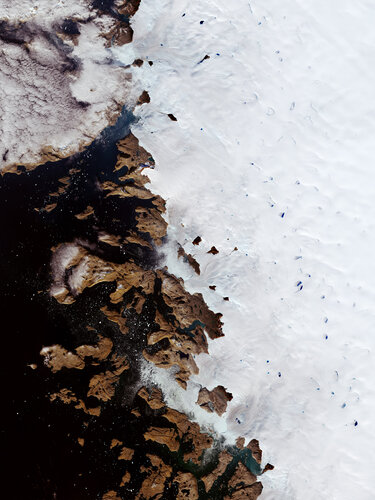
During spring and summer, as the air warms up and the sun beats down on the Greenland Ice Sheet, melt ponds pop up. Melt ponds are vast pools of open water that form on both sea ice and ice sheets and are visible as turquoise-blue pools of water in this Copernicus Sentinel-2 image.
Europe’s new weather satellite sets sail
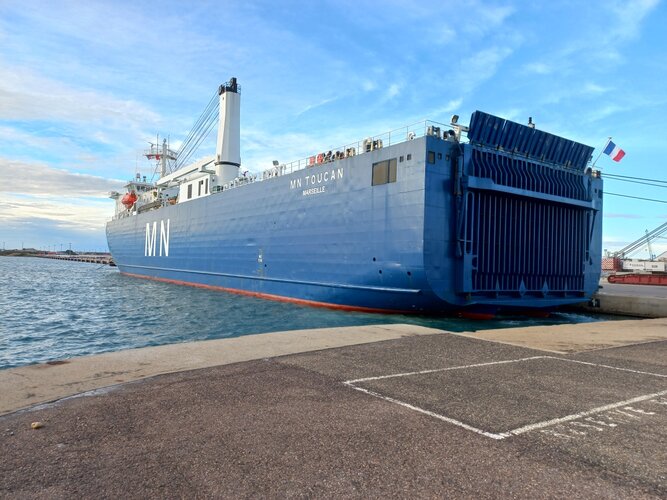
The first of Europe’s Meteosat Third Generation satellites is now safely aboard a ship and making its way across the Atlantic to French Guiana where it will be readied for liftoff in December. Once launched into geostationary orbit, 36 000 km above Earth, this new satellite, which carries two new extremely sensitive instruments, will take weather forecasting to the next level.
Moon science generation
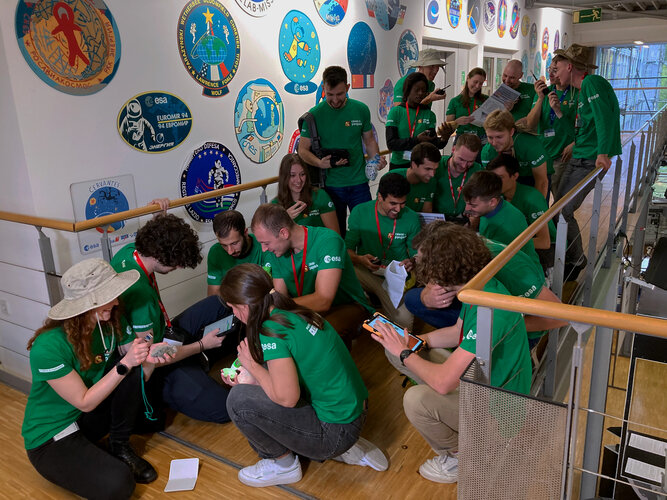 Image:
Image:
What do you call three or more space fanatics? Interns.
Imagine landing your dream internship at the European Astronaut Centre (EAC), and then being unable to go into work. A group of excellent young professionals found themselves in this situation during the pandemic.
This week, however, 23 of these interns finally got their opportunity to visit the home of Europe’s Astronaut corps. The interns had been working on a range of projects developing tools to support astronaut training for missions to the Moon and beyond. Upon visiting, they were immediately immersed in the centre’s activities.
The group, imaged here logging data into
NASA, SpaceX study boosting Hubble to extend its lifespan
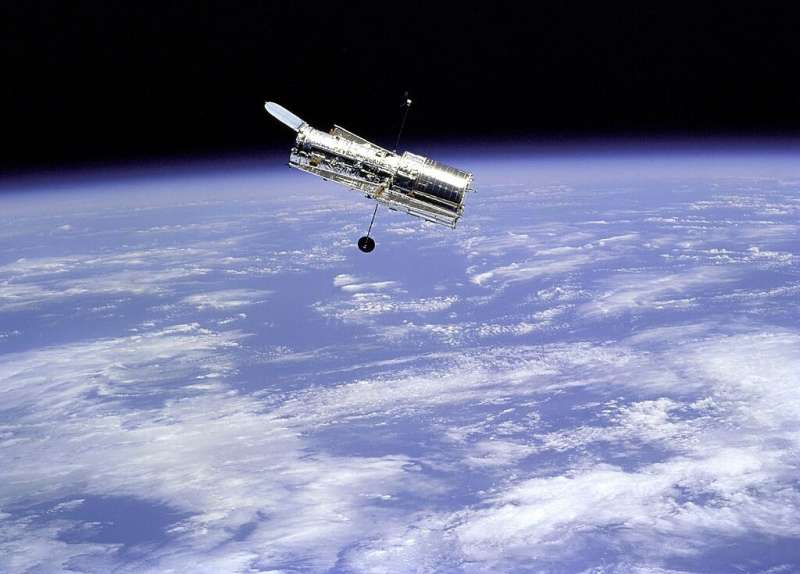
NASA and SpaceX have agreed to study the feasibility of awarding Elon Musk's company a contract to boost the Hubble Space Telescope to a higher orbit, with a goal of extending its lifespan, the US space agency said Thursday.
The renowned observatory has been operating since 1990 about 335 miles (540 kilometers) above Earth, in an orbit that slowly decays over time.
Hubble has no on-board propulsion to counter the small but still present atmospheric drag in this region of space, and its altitude has previously been restored during Space Shuttle missions.
The proposed new effort would involve a SpaceX Dragon capsule.
"A few months ago, SpaceX approached NASA with the idea for a study whether a commercial crew could help reboost our Hubble spacecraft," NASA's chief scientist Thomas Zurbuchen told reporters, adding the agency had agreed to the study at no cost to itself.
New weather satellite on its way to launch
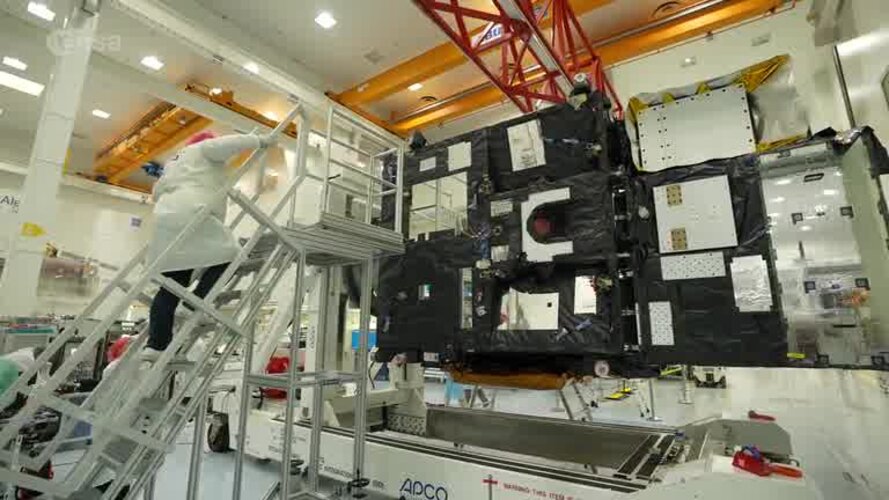 Video:
00:04:04
Video:
00:04:04
The final pre-launch preparations for the first Meteosat Third Generation (MTG) satellite are underway. The first satellite, called MTG-I1, built by a European industrial consortium led by Thales Alenia Space carries two imagers: an advanced Flexible Combined Imager and, in a first for Europe, a Lightning Imager that will allow the earlier detection of storms and extreme weather events, as well as improve aviation safety.
Building on the long-standing partnership between ESA and Eumetsat, the MTG-I1 will be one of six satellites operating in a fleet, of three at a time, to ensure the continuity of data from
3 Russian cosmonauts return safely from Intl Space Station
Three Russian cosmonauts touched down Thursday on the steppe of Kazakhstan following a six-month mission on the International Space Station (ISS), Russia's space agency Roscosmos said.
Oleg Artemyev, Denis Matveyev and Sergey Korsakov landed at the scheduled time of 1057 GM, 148 kilometers (91 miles) southeast of the town of Zhezkazgan.
Footage broadcast by Roscosmos showed the cosmonauts being helped from the Soyuz descent module, as they become used to the effects of gravity again.
During their 195 days aboard the station, the crew completed multiple experiments and five space walks, Roscosmos said.
The three-person crew blasted off to the ISS to begin their mission in mid-March, weeks after Moscow sent troops into Ukraine starting what it called a "military operation".
In July, Roscosmos posted a photograph of the trio aboard the ISS holding flags of the Kremlin-backed breakaway Lugansk and Donetsk regions to voice support for Moscow's troops in eastern Ukraine.
Their return to Earth comes as four Moscow-held regions of Ukraine—including Lugansk and Donetsk—call on President Vladimir Putin to formally annex the territories into Russia following hastily organized votes that the West says were a sham.
In response to Russia's military campaign in Ukraine, Western capitals have hit Moscow with unprecedented sanctions, including on the aerospace industry.
Rover findings offer glimpse of Red Planet's ancient landscape
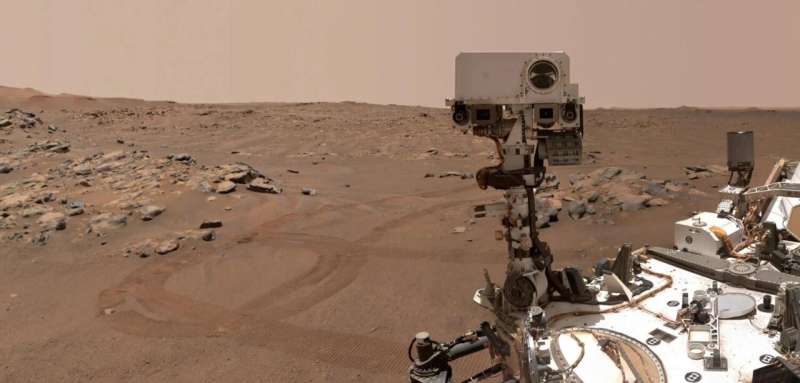
CU Boulder geologist Lisa Mayhew is among the scientists working to recreate the history of an ancient landscape that wouldn't look out of place in Utah—only this terrain sits on Mars millions of miles from Earth.
Mayhew is a member of the science team for NASA's Mars 2020 mission, which is led by the Jet Propulsion Laboratory in southern California. In August, she and her colleagues published some of the first sets of results from the Perseverance rover's exploration of the Red Planet.
The findings take a deep look at Jezero Crater. More than 3 billion years ago, a large asteroid struck Mars, forming this geologic feature that stretches almost 30 miles across and contains rolling sand dunes and craggy cliffs. Using a suite of scientific instruments aboard the Perseverance rover, which is about the size of an SUV, the researchers have begun to explore that landscape's past—showing how igneous rock forms the crater floor and how water reshaped the rocks during a time when a vast lake likely filled this region.
NASA postpones Crew-5 mission over Hurricane Ian
 NASA is shifting the launch date of its Crew-5 mission to the International Space Station in the wake of Hurricane Ian, the space agency confirmed.
"The safety of the crew, ground teams, and hardware are of the utmost importance to NASA and SpaceX," NASA said in a statement on the agency's website.
The launch will now take place no earlier than 12 p.m. EDT on Wednesday, Oct. 5. A
NASA is shifting the launch date of its Crew-5 mission to the International Space Station in the wake of Hurricane Ian, the space agency confirmed.
"The safety of the crew, ground teams, and hardware are of the utmost importance to NASA and SpaceX," NASA said in a statement on the agency's website.
The launch will now take place no earlier than 12 p.m. EDT on Wednesday, Oct. 5. A 



































